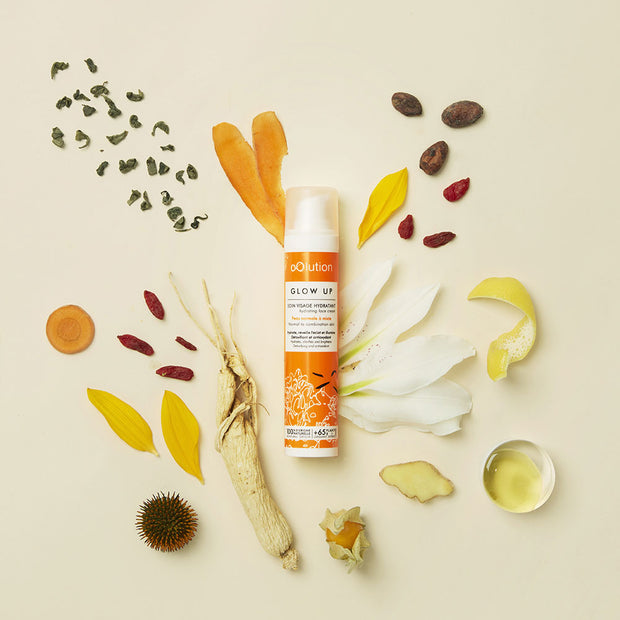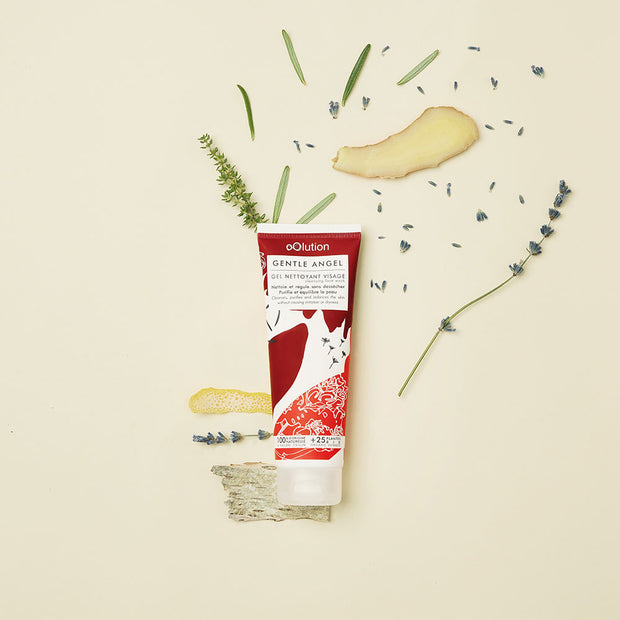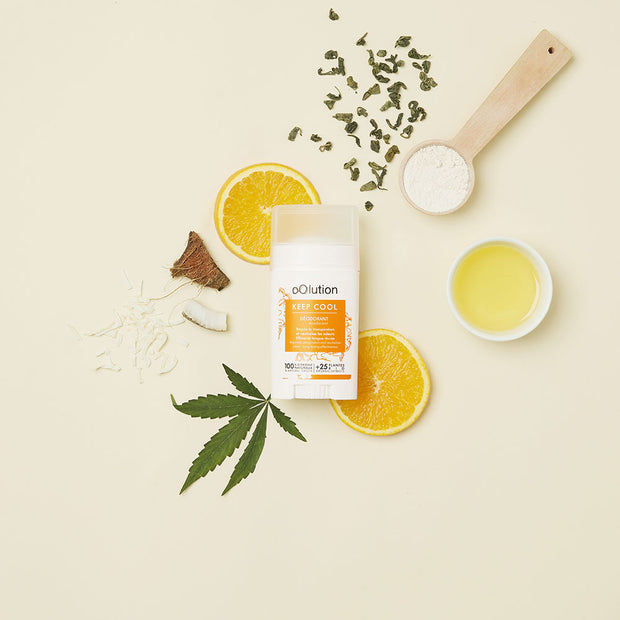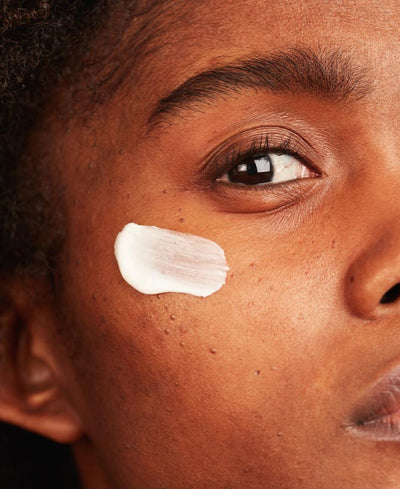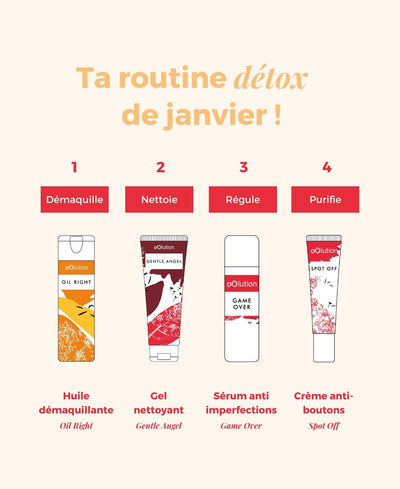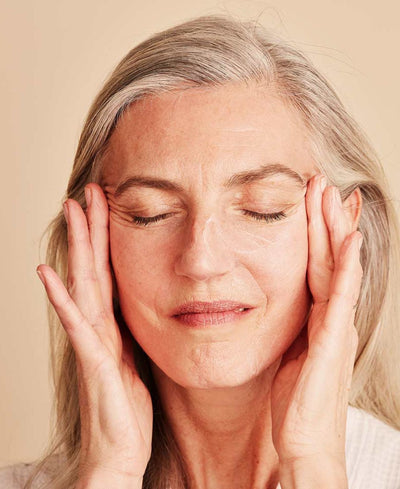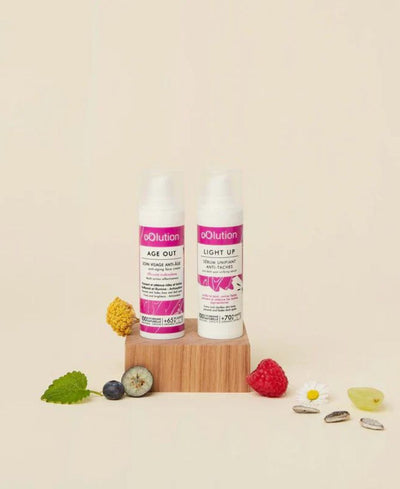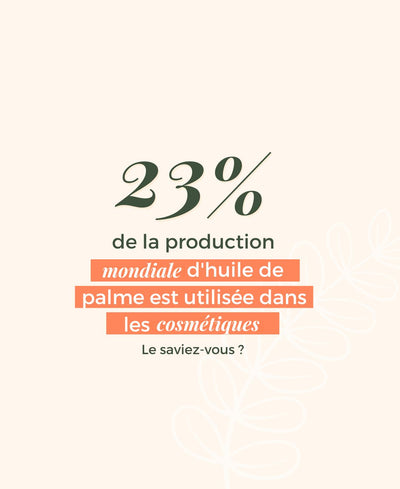
Antiperspirant or deodorant, which is better for my skin?
Written on 16.Dec.19 by Anne-Marie - Updated on 30.Sep.21
Rush hour in public transport, the race to get to the nanny's and then to work on time, the heat... The day has barely begun. You're tempted by this anti-perspirant you've been eyeing in the deodorant aisle. More than 24 hours dry - the dream! But is such a radical solution advisable? Anti-perspirant or deodorant, how do you choose?
Fighting perspiration or fighting odors?
So what's the big deal about sweating? On average, we evacuate 1 liter of sweat a day, without realizing it. But much more, depending on the weather, our activities and our state of health. This makes it much harder to go unnoticed: a feeling of dampness, large halos that turn our clothes yellow, the smell of apocrine sweat... There are two main product families to help us in this fight: deodorants and antiperspirants. Two very different modes of action for the same objective.
Deodorants work after sweat production: they act on odors. By masking them and, above all, preventing them. Yes, it's perfectly possible to continue sweating without unpleasant odors, since our sweat, 99% water, is not malodorous. In any case, as long as bacteria don't get involved, digesting the remaining 1% (lipids and proteins in particular) into odorama. All you have to do is prevent these bacteria from proliferating. An effective deodorant will therefore combine several active ingredients to play three roles:
- absorbent agents, possibly slightly astringent, to absorb moisture and regulate excessive perspiration,
- masking agents against unpleasant odors,
- and finally, antiseptic agents to prevent the proliferation of bacteria and thus the appearance of odors.
An antiperspirant, on the other hand, acts more directly and simply: it blocks the flow of perspiration altogether. A priori interesting for people who perspire a lot... and radically effective for everyone. It makes you wonder why simple deodorants still exist: in a single gesture, no more sweat. No more feeling damp, no more unpleasant odors. And with a unique, highly effective active ingredient: aluminum salts. A dream come true? Not quite.
Anti-perspirants: effectiveness at the cost of health?
The mode of action of antiperspirants is problematic in itself: they interfere with a vital process. And that's not all! Perspiration is essential to the proper functioning of our organism: it regulates our body temperature and acts as an emunctory for the skin, evacuating toxins and waste products. But don't panic: the area of skin affected by antiperspirants is too small to really threaten these functions. But this is not without consequences: perspiration will evacuate elsewhere anyway (neck, face, back...) via the eccrine glands, but without the toxins and waste products that would have been emitted by the apocrine glands in the armpits. Nor pheromones, which could create hormonal imbalances. In short, your excessive perspiration problem hasn't been solved, and you can create other problems for yourself. And beware: excessive perspiration can be the expression of medical disorders. In that case, masking the symptoms and preventing the evacuation of toxins is not the best idea! Forget the antiperspirant and consult your doctor instead.
Above all, do you know how the aluminum salts in antiperspirants really work? They create a little local inflammation. The skin thickens in response, gradually blocking the pores through which sweat flows. So they create a plug on the skin's surface to retain sweat in the body. Sounds like a good idea, doesn't it? The potential side-effects of daily application are less magical: irritation, eczema, even painful cysts or inflammation of the sweat glands. And the thin, moist epidermis of the armpits is not one of the easiest to treat...
What about limiting the use of antiperspirants to special occasions and important appointments? It's not as bad, yes. But do you know what all aluminum salts have in common? They're toxic because of the aluminum they gradually build up in our bodies . Suspected of playing a role in bone damage, anemia and the development of diseases such as Alzheimer's and Parkinson's, they have also been implicated in the development of breast cancer . Studies have shown that they are most often born right where deodorant is applied, where mammary glands are also located. What's worse? Sweat is the main way our bodies get rid of a small portion of the aluminum they receive. Not content with making us ingest aluminum, antiperspirants also prevent us from getting rid of the little we do manage to evacuate!
Studies on the subject are still being debated. These illnesses are the result of many other factors, and the doses of aluminum that enter the body via antiperspirants are low. But if you can avoid them, why not? Staying away from them is a good precautionary principle, especially when pregnant, breast-feeding or suffering from kidney failure. Even more so if your deodorant is a spray: the surface area of the skin to which the deodorant is applied is greater, and the risk of inhalation is real.
Simple deodorant: a safe solution?
So all you have to do is opt for a deodorant and you're safe? Unfortunately, it's not that simple.
First of all, it's not enough to make sure your product isn't called antiperspirant. Manufacturers are feeling the pinch: this term, used to disguise aluminum salts, is coming under increasing fire. It's hard to continue deceiving better-informed consumers. However, there is no obligation to indicate in black and white that a product has such an action. As a result, cosmetics claiming to be simple deodorants are in fact composed of ingredients worthy of antiperspirants. Does your deodorant promise to last an incredible length of time or to get rid of the strongest odors? Beware! The race to see who can offer the most extravagant efficacy seems limitless. And a little ridiculous: a deodorant that's effective for 96 hours... but why?!
In short, once again, the only piece of advice that's worth taking is to scrutinize the labels, which are obliged to indicate the presence of aluminum salts. As it happens, they are often at the top of the list, and quite easy to spot, with the term Aluminium or Alum appearing clearly: Aluminium Chlorohydrate, the most common and authorized with no concentration limit, Aluminium Lactate, Aluminium Zirconium, Aluminium Stearate, Aluminium Hydroxychloride, Aluminum Chloride, Aluminum Chlorohydrex, Aluminum Sesquichlorohydrate, Aluminum Zirconium Trichlorohydrex GLY... The most effective, Aluminum Chloride is also the most irritating. It is found almost exclusively in de-transpirants that promise to put the sweat glands to rest for several days! Some are toxic to the lungs and therefore prohibited in aerosols. And if you were thinking of turning to antiperspirants that claim to be natural, you'd be wrong: they generally contain alum stone. In other words, aluminum salts. Their harmfulness is still a matter of debate, but on the principle of precaution, we're just as likely to avoid them.
Are you sure your deodorant has no antiperspirant action and is free of aluminum salts? Well, that's... only a good start. Because deodorant remains one of the most problematic cosmetics: Triclosan, an endocrine disruptor responsible for the emergence of resistant bacteria, synthetic fragrances that are endocrine disruptors and allergens, toxic preservatives.... the list of substances to avoid is long. Perhaps even more so than with other products, it's important to choose with care. An organic deodorant guarantees the absence of aluminum salts, but don't stop there! Rather than a label, look first and foremost for a natural deodorant that's well formulated, effective and free from substances harmful to health and the environment. And with the utmost respect for your skin: moisture-absorbing plant powders combined with the purifying, astringent and antiseptic virtues of plant oils and hydrolats will also soothe and strengthen the epidermis. Depending on your skin's tolerance and any allergies you may have, and excluding pregnancy and breastfeeding, you can add essential oils, with their powerful virtues and natural fragrances.
Anti-perspirants are super effective, yes. But avoiding rings under your arms and a few unwanted scents simply isn't worth putting your body through the effects of an antiperspirant. The best deodorant, respectful of your body and your health, won't be able to compete at 100%, that's true. If you're a fan of antiperspirants, you may need a little time to readjust when you go natural: for your body, which will relearn how to regulate the production of its sweat glands. And for you, who will rediscover certain forgotten sensations. But once you've got over this hurdle, a deodorant with high-quality, well-chosen natural active ingredients will be incredibly effective. And it's gentle too.
Recommended products
